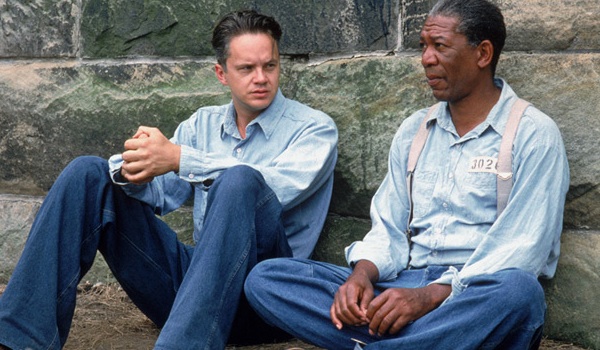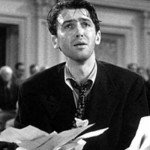The Shawshank Redemption Review
It’s the highest rated film of all-time on IMDb, but is “The Shawshank Redemption†worthy of that title? Well, no. But that doesn’t mean it’s a bad film by any stretch of the imagination. It’s a powerful look at the prison system and raises questions regarding what it means to be guilty or innocent. It’s a bit heavy-handed, and for a while, it lacks narrative direction, but it grabs hold of your emotions and doesn’t let go for a second.
When the film opens, Andy Dufresne (Tim Robbins) is being sentenced to two consecutive life sentences in prison for the murder of his wife and her lover. Andy maintains his innocence, even after he is sent to Shawshank Prison, where everyone is “innocent.†After struggling for the first few months as a prisoner, Andy meets Red (Morgan Freeman), who takes him under his wing after Andy is able to score him a few beers from one of the guards. Red is the guy everyone wants on his side; he has the uncanny ability to get anything you want from the outside—cigarettes, gum, even posters of Rita Hayworth.
As time goes by, Andy, Red, and the rest of the inmates do what they must to survive. For Andy, that means helping the warden (Bob Gunton) embezzle hundreds of thousands of dollars. And for many of the other inmates, survival means staying close to Andy. For an innocent man, he certainly adjusts well to life on the inside, and his friends thrive in ways they never would on the outside. But when Andy finds out the truth about the night his life changed, he starts to crack and no longer cares about the little world he created. He only has one thing on his mind—getting out.
For all its flaws, “The Shawshank Redemption†is a very powerful film. They way it depicts life on the outside is very interesting and, especially as it relates to James Whitmore’s character, Brooks, very moving. And the characters are three-dimensional, a rarity for a film this uplifting.
The major problems relate to the final 30 minutes. The film plays almost like a road trip for the first two hours. It presents a series of loosely related vignettes about life in prison—the connective tissue being they are almost about Andy and are narrated by Red. The end, however, focuses more on Andy’s quest to get out, and here, the film gets very heavy-handed and much less interesting. The point-of-view in the first two hours is unique. Rarely do we see prison as more desirable than the outside world. The ending is much more conventional. It ties up all the loose ends and gives us the requisite happy ending. But part of me thinks it would’ve been much more interesting and powerful if we were left hanging in some way.
The acting is tremendous. I’m a firm believer that Tim Robbins’ best performance was in “Mystic River,†but his work here comes close. Andy always maintains a quiet dignity, even during his first few months in prison during which he is beaten and raped repeatedly. As he accrues power, he comes out of his shell and becomes very charismatic. Robbins does both sides very well. Morgan Freeman is great, as always. But the best-in-show award goes to James Whitmore. The scenes with Brooks outside prison are easily the most emotionally resonant. And even when he’s still inside, he steals just about every scene he appears in.
This is one of those insanely beloved films that everyone should see in his or her lifetime. It’s not the greatest by any means (sorry, IMDb users), but it’s hard not to love and well worth your time.
















